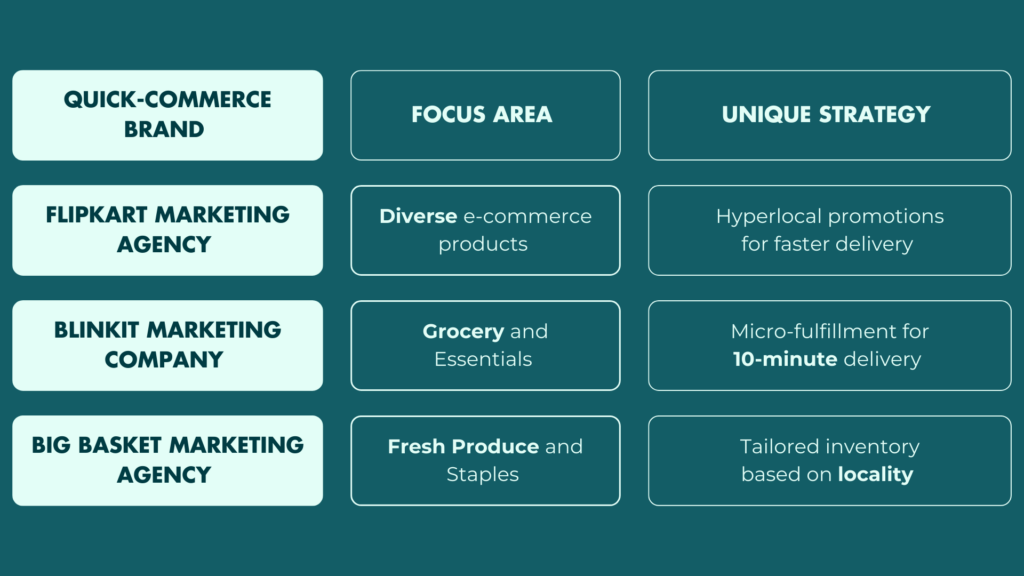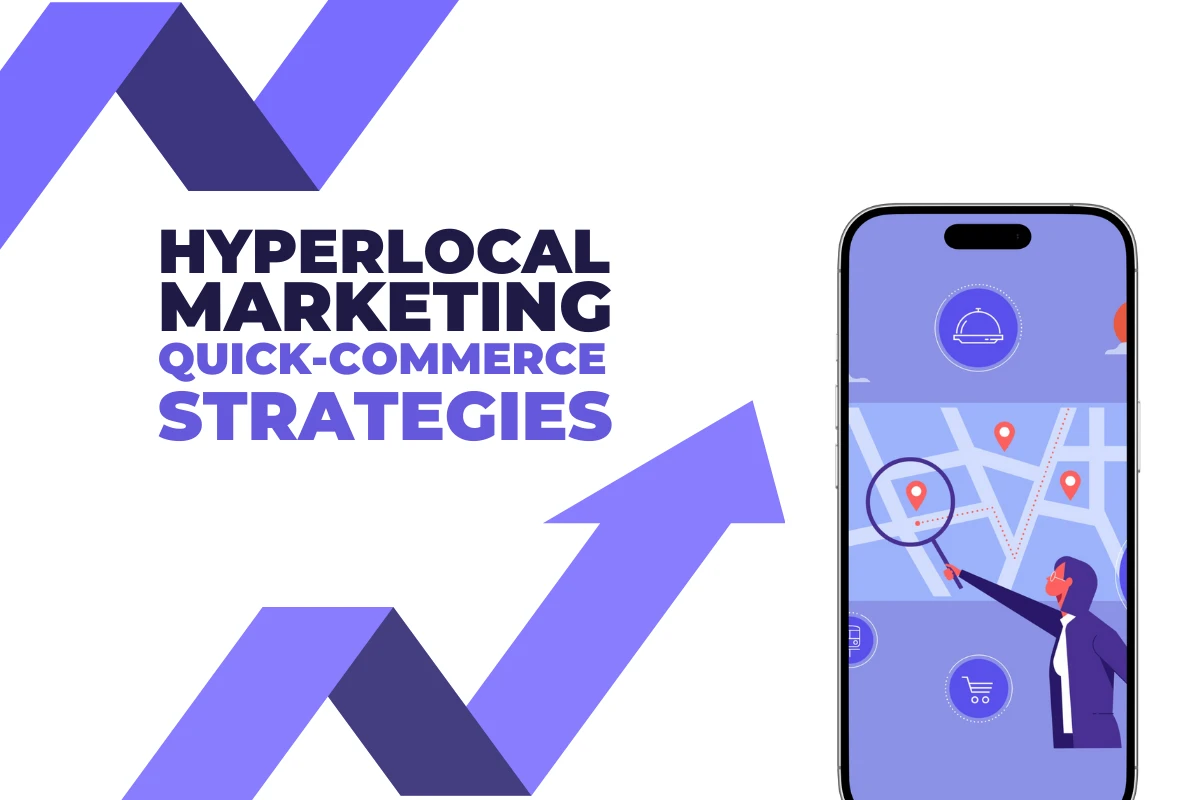In today’s fast-paced digital economy, businesses are racing to keep up with consumer expectations. One of the most groundbreaking shifts in recent years has been the rise of hyperlocal marketing. This marketing approach focuses on targeting customers within a highly specific geographic area, often tailoring offerings to suit local needs. The emergence of quick-commerce strategies—business models designed to deliver products within hours or even minutes—has taken hyperlocal marketing to new heights. By combining the immediacy of quick commerce with the precision of hyperlocal targeting, businesses are unlocking unparalleled opportunities to engage consumers.
Quick-commerce strategies are reshaping how businesses operate, especially in the e-commerce marketplace. Companies like Flipkart, Blinkit, Big Basket, and Zepto are leveraging hyperlocal marketing to drive growth and meet consumer demands for speed and convenience. As we dive deeper, we’ll explore how these strategies work, their key components, and how businesses can implement them effectively to stay ahead in the competitive market.
The Evolution of Hyperlocal Marketing in Quick Commerce
Hyperlocal marketing has evolved significantly over the years, driven by advancements in technology and changing consumer behavior. Initially, hyperlocal marketing focused on small-scale businesses catering to local neighborhoods. However, the rise of e-commerce platforms and quick-commerce marketing agencies has transformed this concept into a sophisticated, data-driven strategy.
With quick-commerce strategies, businesses can now use hyperlocal insights to optimize delivery times and improve customer engagement. Platforms like Zepto and Blinkit exemplify this approach, ensuring that products reach customers’ doorsteps in as little as 10 minutes. This rapid service is made possible by strategically placed micro-fulfillment centers and a deep understanding of local consumer behavior. Quick-commerce marketing services help companies analyze data on local preferences, enabling them to tailor their offerings effectively.
For example, a Blinkit marketing company might analyze purchasing patterns in a specific locality to stock high-demand items. Similarly, a Big Basket marketing agency can use hyperlocal insights to optimize inventory and personalize promotional campaigns, ensuring they resonate with local customers.
Key Components of Effective Quick-Commerce Strategies
To implement successful quick-commerce strategies, businesses must focus on the following key components:
1. Localized Inventory Management
Maintaining the right inventory at micro-fulfillment centers is critical for meeting local demands. Quick-commerce services marketing agencies specialize in analyzing data to determine what products are most likely to sell in specific neighborhoods. This reduces wastage, improves customer satisfaction, and increases profitability.

2. Targeted Marketing Campaigns
Quick-commerce services marketing companies utilize targeted campaigns to attract local audiences. E-commerce marketplace marketing services leverage data analytics to create personalized advertisements. For instance, a Flipkart marketing company might run hyperlocal campaigns promoting flash sales in a specific area. Similarly, Tata 1mg marketing agencies use localized messaging to promote health products and services that cater to regional needs.
3. Streamlined Logistics and Technology
Efficient logistics and technology form the backbone of quick-commerce strategies. Zepto marketing agencies, for instance, employ advanced route optimization algorithms to minimize delivery times. Netmeds marketing services use real-time tracking systems, enabling customers to monitor their orders. This seamless integration of technology ensures that quick-commerce businesses can deliver on their promise of speed and reliability.
4. Customer-Centric Experience
At the heart of hyperlocal marketing lies a commitment to enhancing the customer experience. By understanding local cultures and preferences, quick-commerce marketing agencies can create meaningful connections with consumers. Blinkit marketing agencies, for example, offer localized deals during festivals, while Netmeds marketing agencies focus on promoting health and wellness products tailored to specific demographics. These strategies not only improve customer engagement but also foster loyalty.
The Impact of Quick-Commerce Strategies on E-commerce
The integration of hyperlocal marketing and quick-commerce strategies is revolutionizing the e-commerce marketplace. By focusing on speed, convenience, and personalization, businesses can address some of the most pressing challenges in online retail, such as cart abandonment and customer retention.
E-commerce marketplace marketing agencies play a pivotal role in this transformation. By collaborating with brands like Flipkart, Blinkit, and Big Basket, they help businesses streamline their operations and craft compelling marketing campaigns. The rise of quick-commerce marketing services has also paved the way for smaller players to compete with industry giants, creating a more diverse and competitive market.
For instance, Flipkart marketing services have been instrumental in driving hyperlocal sales during regional festivals, while Tata 1mg marketing agencies focus on promoting essential medicines and health products. This tailored approach ensures that consumers receive timely and relevant offerings, enhancing their overall shopping experience.
Conclusion
As consumer expectations continue to evolve, the rise of hyperlocal marketing and quick-commerce strategies marks a significant shift in the e-commerce landscape. By focusing on localized inventory management, targeted marketing campaigns, streamlined logistics, and customer-centric experiences, businesses can stay ahead in this dynamic industry.
The integration of quick-commerce strategies with hyperlocal marketing has proven to be a game-changer for companies like Flipkart, Blinkit, Zepto, and Netmeds. These brands, supported by quick-commerce marketing agencies and e-commerce marketplace marketing services, have set new benchmarks in speed, convenience, and personalization.
If your business is looking to harness the power of quick-commerce strategies, AKOI offers cutting-edge solutions tailored to your unique needs. Whether you’re aiming to reduce cart abandonment or boost customer engagement, our comprehensive quick-commerce marketing services can help you achieve your goals. Reach out to us today and let’s take your e-commerce business to the next level!


